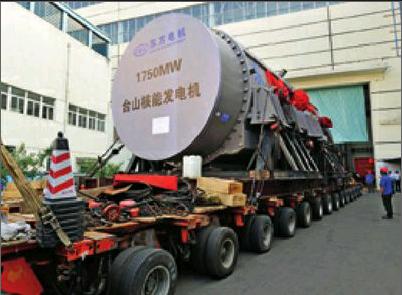Fuel for a Revolution
2014-07-28ByZhouXiaoyan
By+Zhou+Xiaoyan

On the back of expanding industrialization and urbanization, Chinas energy demand has been on the rise for years, making it the largest energy producer and consumer in the world. But external uncertainties on the international geopolitical front have put China in need of producing more energy itself and controlling its runaway energy consumption. Pollution problems have also forced the country to reduce the use of fossil fuels and increase energy efficiency.
On June 13, Chinese President Xi Jinping urged more efforts to revolutionize the countrys energy production and consumption habits. Heading a meeting of the Central Leading Group on Financial and Economic Affairs, Xi acknowledged that China faces challenges in coping with rising energy demand, supply restraints, huge environmental costs and backward technology.
Xi said China is working on a guideline to direct energy production and consumption in the coming years and will accelerate revisions of outdated regulations.
China will upgrade coal-burning power generators that fail to meet emission reduction requirements and continue to develop long-distance power transmission lines. It will expand oil and gas cooperation with countries in Central Asia, the Middle East, America and Africa. The country will also intensify its efforts in energy exploration and exploitation, and in building more oil and gas pipelines and storage facilities, said Xi.
Lin Boqiang, an energy researcher at Xiamen University, said that the Chinese leadership is viewing the issue from the standpoint of national development and security.
“A revolution in the energy sector is bound to impact society greatly. The central authorities have used ‘revolution instead of the commonly used term ‘reform, which shows their determination to shift the status quo,” said Lin.
Analysts said innovations in administrative governance are required to affect a revolution in energy production and consumption.
Niu Li, an economist at the State Information Center, a government think tank, said that shale gas, gas hydrate, electric vehicles and energyefficient housing are likely to be areas which will boost an energy revolution.
“In the wake of the financial crisis, all nations are trying to nurture new energy technologies as a new engine to drive economic growth,” Niu said.
Structural change
China will also attempt to reform pricing mechanisms and nurture a competitive energy market, according to President Xi. Experts reacted favorably to Xis call to accelerate Chinas energy production and diversity and to raise energy efficiency. They said the leaderships resolve in pursuing an energy revolution will pave the way for more non-state companies to enter the industry and foster healthier competition in the sector.endprint
Lin said he was most impressed by the proposed “institutional revolution in the energy sector.”
He said two tasks are paramount in revolutionizing Chinas energy sector—breaking up the monopoly of state-owned enterprises(SOEs) and letting the market decide energy prices.
Currently, Chinas energy sector is monopolized by SOEs and energy prices are controlled by the government.
“Right now, about 86 percent of the energy sector is state-owned and that proportion is increasing. The SOE monopoly should be broken up to add more competition to the sector,” Lin said.
Chinas energy resources are mostly located in the less developed central and western regions while the developed coastal regions have huge energy demands. Energy output provinces have made tremendous contributions to economic development by diverting energy to other better-off regions at governmentmandated prices. Worse still, the energy production process has heavily polluted these energy-rich regions. Its a situation analogous to the poor helping out the rich, analysts said.
Lin said the lack of a market-based pricing mechanism makes it harder to attract private capital into the energy sector.
The reform of the pricing mechanism of energy products is progressing very slowly, partly because price is used as a tool in government macro-control policies. Setting and adjusting energy prices involves complicated work inside the government and represents a “game of interests” among the parties concerned. Such direct government price intervention will lead to uncertainty in profits, making private capital more reluctant to enter the energy sector, Lin added.
“Opening up the energy sector in itself is not sufficient. A reform on the pricing mechanism is needed to make the sector more lucrative so that it is more attractive for private investment,” Lin said.
Lin singled out electricity price as the factor that is most heavily controlled by the government.
“The electricity grid is completely monopolized by SOEs. It will be a complicated reform and represents a tall order.”
A good start point for the reform would be tying the price of electricity to the price of coal, as the latter is now mostly determined by the market, Lin suggested.
Wang Zhen, Deputy Director of the Academy of Chinese Energy Strategy with the China University of Petroleum, said a structural revolution would lead revolutions in other areas.endprint
“An institutional revolution would constitute a milestone and will have huge impact. We used to treat energy products as public products with great strategic significance instead of commodities,” Wang said.
The country should treat them as commodities and establish an effective market system to push forward other “revolutions” including a consumption revolution, a supply revolution and a technology revolution, he commented.
Tapping nuclear energy
After the Fukushima nuclear disaster in March 2011, China immediately commenced safety inspections at all existing nuclear plants and stalled approval on proposed new plants.
It was not until October 2012 that plans for nuclear power safety and long-term development of nuclear power were passed, with approval being granted for a few projects in coastal areas before 2015, and none in inland regions.
Top leaders recent high-profile stance on the issue signals that turning to nuclear power is perhaps an inevitable trend in China. Nuclear power will be used by the country to combat smog, optimize energy structure and even lift its slowing economy.
By 2015, China aims to reduce energy consumption per unit of GDP by 16 percent from the 2010 level. The indicator dropped 9.03 percent from 2011 to 2013, only 54 percent of the overall target, according to the National Development and Reform Commission.
The need to conserve energy, reduce emissions and steer away from reliance on coal has never been more apparent or pressing.
“In reality, the development of nuclear power is all about replacing coal,” said Liu Qiang, an energy expert with the Chinese Academy of Social Sciences. Considering the economic realities, nuclear power is unlikely to face much opposition, Liu said.
Coal still accounts for the bulk of Chinas energy consumption. At the end of 2013, nuclear power only accounted for 2.11 percent of Chinas total. The installed nuclear power capacity represented only 1.19 percent of total power generation capacity, according to data from the China Nuclear Energy Association.
“Chinas nuclear power sector still has a long way to go before reaching the global average,” said Ye Qizhen of the Chinese Academy of Engineering.
A proportion of 10 percent of nuclear power would be an ideal figure for China, Ye said.
He Jiankun, Director of the Low Carbon Economy Lab at Tsinghua University, said new energy technologies will become a major growth driver in the future.
“Developed countries are trying to expand businesses in developing countries, with their technological advantages in the new energy sector. The nuclear energy industry is highly scientific and technological in nature and requires both long research and development periods and hefty investment,” he said.
“Only a few major powers in the world are capable of mastering the industrialization of nuclear energy. China should fight for competitive edge in that regard,” said He.endprint
